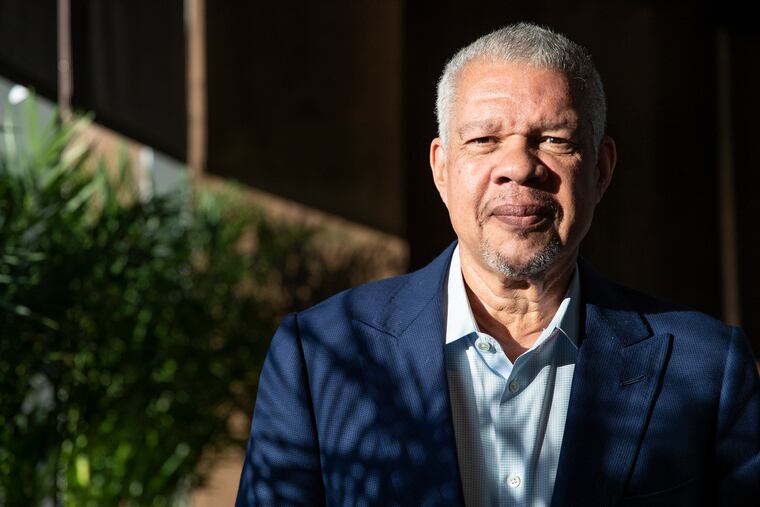Leslie Brun: The ‘finance industry version of Roberto Clemente’
Brun, 67, is a hall of famer, too, as he should be. Born in Haiti, he came to the United States as a little boy, without knowing a word of English.

Leslie A. Brun calls himself “the finance industry version of Roberto Clemente.”
Clemente is the first Puerto Rican and Caribbean player inducted into the Baseball Hall of Fame. He grew up working in the sugarcane fields and went on to become one of baseball’s best players and a respected philanthropist.
Brun, 67, is a hall of famer, too, as he should be. Born in Haiti, he came to the United States as a little boy, without knowing a word of English. That wouldn’t be much of an obstacle: Brun is gifted at languages.
In fact, not much has proved an obstacle. As of today, Brun is chairman and CEO of Sarr Group LLC, a holding company for his investments. He is also vice chairman and senior partner at G100 Cos. He also was managing director and head of investor relations in the New York office of CCMP Capital Advisors.
Brun’s advice and presence are much sought after. He’s the lead independent director of Broadridge Financial Solutions Inc.; a member of the board at Corning Inc.; lead director of Merck & Co. Inc.; and chair of the compensation committee of Hewlett-Packard Enterprise. Among many other things, he’s also on the Council on Foreign Relations.
“I didn’t start out wanting to be in banking,” he said. “I got a bachelor’s in social welfare at the University of Buffalo, and I came home to New York and started driving a cab. That did not make my parents happy. They said, ‘You have to do better.’”
Better included a stint in Seoul, South Korea, as assistant vice president and chief credit officer for Chemical Bank. And, yes, he picked up Korean. At length, the New Yorker came to Philadelphia, working from 1988-1991 at Fidelity Bank and becoming co-founder and CEO of Hamilton Lane Advisors (1991-2005).
Does Brun ever wake up wondering how it all came to be? “Every single day,” he said. “Listen, I’m still frightened that I will wake up one day and it will all be a dream. It’s true of almost everyone I know who has achieved any degree of success: They don’t see themselves, and I don’t see myself, as anything that special or different. I’m just doing what I do.”
Joe Neubauer, former CEO of Aramark Corp., is a fellow immigrant (in Neubauer’s case, from what was then Mandatory Palestine). “He came from humble beginnings,” Neubauer said, “and he has such a positive philosophy. He views the American Dream the way I view it: You have the opportunity to achieve things you can’t in any other country. A lunch with Les is always a great opportunity and I always learn something.”
“Everything is people,” Brun said. “Every success is about how you find a way to connect with someone, or some group of someones, so they trust they are getting some of what they are looking for in a particular contact or relationship. I credit my background in social welfare and my time as a taxi driver – those really helped me develop my people skills.”
“If Les had stayed in social work,” said Brian Tierney, CEO of Brian Communications, “he’d have been Secretary of Health and Human Services in no time. He has a way about him. When he looks you in the eye and shakes your hand, you know it’s going to get done.”
They first met when Tierney recruited Brun for the board of trustees at Episcopal Academy. “He’s constantly talking about luck, quick to say, ‘I’ve been very fortunate,’” Tierney said, “but with his life experience and achievements, he’s inspired a lot of business people, and a lot of kids across this region. He’s really made an impact here.”
Among Brun’s activities is his position as lead director of the board of directors of Merck. Ken Frazier, CEO of the company, said, “I think very highly of the man. He’s an unusual director, sensitive to the company’s desire to create both societal value – in developing medicines that can be life-saving or life-enhancing – and economic or shareholder value.” Frazier described Brun as smart, curious, very effective under pressure and “great at creating the comfort level that makes a board work well. Plus he’s got great values.”
And he loves Philadelphia.
“When I lived in New York, I used to think, ‘We’re in New York City – where else would you ever want to live?’ until I moved to Philadelphia,” Brun said. “It’s an extraordinary, welcoming city. My kids have such a wealth of choice of schools. You get to know a couple of people, and they introduce you to everyone they know. Once people believe it’s worthwhile knowing you, it’s incredibly embracing.”
And he keeps seeing opportunities to make companies or create partnerships. Characteristically, he described it as “a people thing.”
He continued, “More than anything, you’re sensitive to people. And then you identify a set of characteristics that gives you cause to see a degree of drive, a higher probability of success. That sensor is always on.”
The biggest fear of this prodigiously talented man? “That I will become irrelevant,” he said. “What helps me there is having a 16-year-old daughter who keeps me current in the latest technology, thinking and vernacular. It takes me out of my comfort zone, and I learn something new – fully recognizing that I’m deluding myself if I ever think I’ll catch all the way up.”